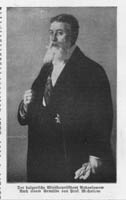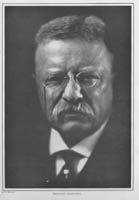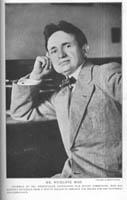Table of Contents
Key Figures
Statesmen
a | b | c | d-e | f | g | h-i | j-l | m | n-o | p | r | s | t-v | w-y
Vasil Radoslavov (1854-1929)
A Bulgarian politician and statesman, Radoslavov served as the Prime Minister of Bulgaria during most of the First World War. Radoslavov first served in the government in 1884, becoming the Minister of Justice for two years. He was reappointed to the position in 1894 and became the Minister for Internal Affairs in 1899. One year later, Radoslavov became the Premier of the kingdom, but his government was tainted by corruption. He remained out of power until 1913, when Tsar Ferdinand appointed Radoslavov to serve again as Prime Minister. The tsar appreciated Radoslavov's pro-German policies and his anti-Russian bias, especially in light of Bulgaria's disastrous defeat in the Second Balkan War. Radoslavov worked closely with Tsar Ferdinand and successfully negotiated a critical Austro-German loan during the July Crisis of 1914. After the outbreak of World War I, Radoslavov skillfully negotiated with the Allies to assure them of Bulgaria's neutrality while working ever closer to supporting the Central Powers. After Bulgaria declared war in September 1915 and helped overrun Serbia, the Germans applied great pressure on Radoslavov to provide resources to support the Central Power's war effort. As the result of the two earlier Balkan Wars, which had significantly depleted the kingdom's limited resources, the German pressure undermined support for Radoslavov in the Parliament. Radoslavov's decision to support the Austro-German invasion of Romania in the Fall of 1916 further eroded popular support for the war. The Prime Minister supported the YMCA's proposal to introduce POW relief services for Allied war prisoners in the kingdom and agreed to serve on the Bulgarian War Prisoners' Aid Committee. Despite failing popularity, Radoslavov's government remained in power until the publication of the Treaty of Bucharest in May 1918. Tsar Ferdinand was disappointed by the terms of the Romanian capitulation and appointed a new government in June. Radoslavov fled to Germany and into exile in October 1918 and the Stamboliski government sentenced the former Premier to death in absentia in 1922 under the Law for Trying of the Perpetrators for the National Catastrophes. Although pardoned in 1929, Radoslavov remained in exile.
Refik Bey
A major in the Turkish army and a medical doctor, Refik Bey was assigned to the Sanitation Office of the Ministry of War and was responsible for health standards in Turkish prison camps. He participated in the January 1918 conference between Christian Phildius and Turkish officials regarding World's Alliance access to Allied prisoners of war in the Ottoman Empire. Refik Bey strongly supported the introduction of War Prisoners' Aid services to Allied POW's in Turkey.
Elias Riggs (1810-1901)
An American missionary in the Near East in the 19th century, Riggs worked in Greece, Bulgaria, and Turkey from 1832 to 1901. He translated the Scriptures into Armenian in 1853 and into Bulgarian in 1871. He was also a member of the committee which translated the Bible into Turkish in 1878. Riggs' work laid the foundation for the future establishment of the YMCA in the kingdom of Bulgaria.
Theodore Roosevelt (1858-1919)
Twenty-sixth President of the United States, Roosevelt was a dynamic figure in American history. He served in a number of New York state and national political offices before becoming Assistant Secretary of the Navy from 1897-1898. With the outbreak of the Spanish-American War, he organized a volunteer cavalry regiment, the Rough Riders, with General Leonard Wood and fought in Cuba. He became Governor of New York in 1899 and was selected by William McKinley to serve as his Vice President in the presidential election of 1900. Upon the assassination of McKinley in September 1901, Roosevelt became the Chief Executive. During his first administration, he recognized the independence of Panama from Colombia and started the construction of the Panama Canal. Elected to a second term in 1904, Roosevelt mediated the end of the Russo-Japanese War, which culminated in the Treaty of Portsmouth in September 1905. He received the Nobel Peace Prize in 1906 for his efforts. Roosevelt was also a champion of trust-busting and business regulation and stressed the importance of conserving America's national resources. In the election of 1908, Roosevelt tapped William Howard Taft, the Secretary of War, as his successor. Roosevelt spent several years in Africa on big game safaris and traveled across Europe. He was dissatisfied with Taft's policies and decided to run against Taft in the election of 1912 as the head of the Progressive (Bull Moose) Party. The Taft-Roosevelt controversy split the Republican vote and Woodrow Wilson, the Democratic standard-bearer, won the election. When World War I broke out in August 1914, Roosevelt was an ardent supporter of the Allies.
Wycliffe Rose (1862-1931)
An American educator and social welfare activist, Rose began his career as a college professor, which laid the basis for his career in educational promotion and reform. After the Civil War, Rose established the first educational system in the southern United States, which included primary schools and secondary schools, at the University of North Carolina. Recognizing that health had an important bearing on education, Rose became involved in public health issues. With the support of the Rockefeller Foundation, he started a public health program in the South to control hookworm, malaria, and yellow fever. He founded public health schools at John Hopkins University and Harvard University. In 1910, Rose became the Executive Secretary of the Rockefeller Sanitary Commission, a position he held until 1915. He became an original trustee of the Rockefeller Foundation in 1913, and remained on the board until 1928. Rose was also interested in global health issues. In 1915, he became the Director of the International Health Board and served with this organization until 1923. During World War I, Rose became involved in relief operations in Europe and helped found the Commission for the Relief of Poland with the assistance of the American Red Cross. After the war, he established the London School of Hygiene and Tropical Medicines, with the support of the Rockefeller Foundation. He also became heavily involved in the League of Nations and was instrumental in the establishment of the World Health Organization. In 1923, Rose became the President of the General Education Board and the International Education Board.


